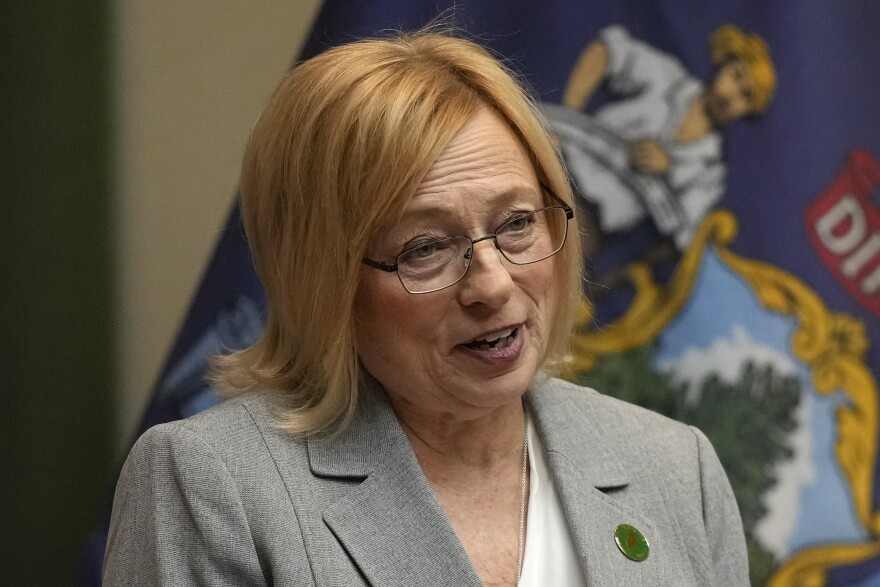State lawmakers have fallen well short of overriding Gov. Janet Mills' veto of bills to boost the incomes of some farm workers and to prohibit businesses linked to foreign governments from participating in Maine ballot campaigns in Maine.
Based on earlier votes, it was clear that supporters of both measures faced uphill battles on Tuesday as they sought to win support from two-thirds of both chambers of the Legislature. Supporters of the foreign electioneering bill had the safety of knowing that, even if the override vote failed, Maine voters will get the final say on the matter because the citizen’s initiative has already qualified for the November ballot. But during a morning press conference and later in floor speeches, Democratic and Republican lawmakers who supported the bill predicted that a ban on foreign government involvement in ballot campaigns was coming one way or another.
“In the last two years, foreign-owned companies have spent over $100 million to influence voters on referendum campaigns,” said Rep. Jennifer Poirier, R-Skowhegan. “Whether we pass this bill through today or it goes to the voters in November, I strongly believe that this bill will become law. It's something that the people of Maine have stated time and time again that they want. It is a common-sense measure to protect our democracy, our sovereignty and our local interests from foreign meddling."
In her veto letter last week, Gov. Janet Mills said the bill raised constitutional concerns and could silence Maine-based businesses that are partly owned by foreign governments. The governor also pointed out that both the Maine Press Association and the Maine Association of Broadcasters had urged her to veto a bill that the organizations said would violate constitutional protections of a free press and force newspapers, radio and television stations and online news sites to check on the ownership status of any advertiser for a ballot campaign.
The House voted 73 to 50 to override the veto, which was less than the required two-thirds margin.
The farm workers bill, meanwhile, failed on a 61 to 61 vote in the House. Mills then promptly created a stakeholder group aimed at proposing a minimum wage for farm workers.
The original version of the bill would have required businesses to pay agricultural employees and seasonal farm workers Maine's minimum wage, which is currently $13.80 an hour, and would have phased in overtime requirements. But supporters say they dropped the overtime language and made other changes in response to concerns raised by farm owners, agriculture groups and the Mills administration.
Rep. Amy Roeder, a Bangor Democrat who co-chairs the Legislature's Labor and Housing Committee, said the final version was a modest step toward putting farm laborers on the same footing as other workers in the state.
“In the last two years, foreign-owned companies have spent over $100 million to influence voters on referendum campaigns,” “Whether we pass this bill through today or it goes to the voters in November, I strongly believe that this bill will become law. It's something that the people of Maine have stated time and time again that they want. It is a common-sense measure to protect our democracy, our sovereignty and our local interests from foreign meddling."
"The process was fair,” Roeder said. “Compromises were made by farm worker interests time and time again only to ultimately be met by another 'no' from lobbyists for Maine's largest farming interests and another veto."
Many of Maine’s larger agricultural organizations strongly opposed the bill, which they said would increase for businesses often operating on small margins and competing with farms in other states. They also said many farm workers already earn well in excess of Maine’s minimum wage.
But organizations such as the left-leaning Maine Center for Economic Policy, the Maine AFL-CIO and the Maine Organic Farmers and Gardeners Association criticized the governor for vetoing the bill.
“We grant minimum wage protections to workers throughout our country, yet deny these protections to farmworkers due to systemic racism and historic marginalization,” said Juana Rodriguez-Vazquez, executive director of organization Mano en Mano that works with farm workers and immigrants. Rodriguez-Vasquez also serves on the state’s Permanent Commission on the Status of Racial, Indigenous, and Tribal Populations. “Farmworkers are the backbone of the potato, blueberry and seafood harvests- the iconic products of Maine. They are an essential part of what makes our economy strong, and communities vibrant- yet they are not afforded basic rights.
In her letter to lawmakers last week, Mills said she reluctantly vetoed the bill because of confusion about whether it could inadvertently affect other parts of Maine's labor law. And just hours after the House vote, the governor issued an executive order creating a stakeholder group charged with crafting a clearer compromise bill on a minimum wage for farm workers.
“I strongly support a state minimum wage for farm workers and am committed to signing one into law,” Mills said in a statement. “This stakeholder group will allow for a longer and more in-depth analysis of the language of LD 398, resolve questions within the agricultural community about what the bill does and does not do and what aspects of farm employment it may change, and help all parties arrive at a shared understanding so that we can move forward with and implement a farm worker minimum wage next year.”



